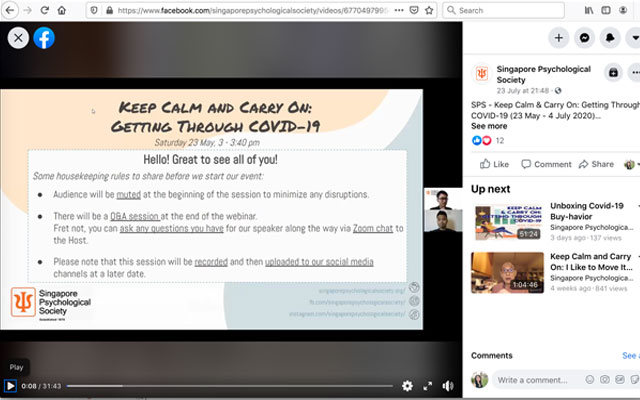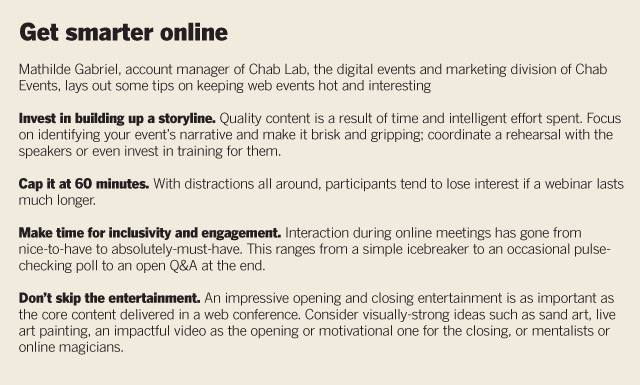The online space has become the favourite meeting room for many associations that need to maintain engagement with members and the public, but risks of webinar fatigue need to be addressed.
Associations that once had an array of face-to-face engagement tools at their disposal – conferences, meetings, training workshops, social functions, community volunteerism programmes – prior to the Covid-19 pandemic, have found themselves restricted to just online formats due to travel restrictions and event capacity limitations in many destinations.
However, for some association chiefs, this predicament has turned out to be a blessing in disguise, as moving communications and engagement online has resulted in richer exchanges with an expanded audience.

Prior to the pandemic, the Singapore Psychological Society (SPS) had never ventured online with its member activities. It followed the traditional route of face-to-face workshops and conferences, newsletters and emails.
Today, SPS conducts one or two member-facing special interest online events every month to maintain engagement and exchange, and has started a topical series for the public on social media platforms to address psychological issues arising from the pandemic and lockdown.
Going online has also allowed SPS to avoid having to restrict its events only to days when rental rates were lower and space was available, said president Cherie Chan.
Another benefit of the digital event shift, according to Chan, is her team’s new confidence in running online events.
Carlin Lee, SPS vice-president, shared that the team has since decided to convert the society’s annual Student Research Awards into an online edition, and are deliberating plans for a conference segment with multiple breakout rooms to facilitate in-depth topical discussions.
International Congress and Convention Association’s (ICCA) regular Business Exchange, which once brought in small numbers of participants, has seen “huge interest” since going online, revealed Noor Ahmad Hamid, regional director Asia Pacific.

The online shift also brings additional revenue-generating potential, opined Octavio Peralta, secretary general of the Association of Development Financing Institutions in Asia and the Pacific, and the president & CEO of the Philippine Council for the Advancement of Association Executives (PCAAE).
“The pricing model for a webinar will not be comparable to a face-to-face seminar because the organisational cost is different, but that is not to say that a webinar will not make money. I believe associations now have the capacity to expand its reach beyond their members. There is also an opportunity for a recurring revenue in webinars as they can be recorded, repurposed and re-marketed in the future as an on-demand resource,” said Peralta.
He shared that PCAAE’s webinar offering strategy is two-fold – information-sharing webinars are free to the public to raise visibility and attract potential sponsors while unique content and certificate-granting webinars attract a registration fee.
Something old, something new
Long before online and hybrid events were necessitated by travel and event restrictions, the Professional Convention Management Association (PCMA) created Convening Leaders Live, an annual hybrid event that brought in strong online and offline attendance from around the world. It also maintained a digital strategy at a time when few other associations saw the need for one.
Since the onset of the pandemic, PCMA has intensified its online activities. Engagement with the board and members are more frequent through online means such as e-direct mails, Zoom meetings and focus groups, webinars and a bi-weekly Covid Recovery Dashboard survey. PCMA reports a 64 per cent year-on-year spike in website traffic through June, with over 300,000 views of its Covid-19 content alone.
The Covid Recovery Dashboard survey has proven to be “incredibly popular”, said Karen Bolinger, PCMA’s managing director for Asia-Pacific, attracting about 1,000 responses each time.

Online trainings and meetings are not new to ICCA too, as these virtual options are held to encourage wider attendance by its global membership, revealed Noor. But he told TTGassociations that the organisation has never “gone to the extent of moving all events to virtual or hybrid (platforms)”.
“With this pandemic and since travel is not possible, all activities have gone virtual. For example, our annual Association Meetings Programme (June 29-30) was completely virtual,” Noor remarked, but added that as destinations begin to reopen for domestic travel, his organisation has been able to get some hybrid events off the ground.
“For example, the ICCA Congress in Kaohsiung this November and ICCA Asia Pacific Summit in Yokohama this December will be hybrid events,” he added.
Battling fatigue
ICCA now hosts an average of four to five virtual meetings and webinars each month, excluding training programmes. The schedule was a lot busier in the beginning of the global travel freeze, with “quite a number of webinars” conducted for the various regions and sectors of its membership.
“However, as we are coming into webinar fatigue, we decided to only organise one if it is necessary. Online trainings are an exception – they have gone up dramatically because most members are investing this (downtime) into training and learning,” explained Noor.
Declaring that “webinars are one of the best options and means for associations to stay connected with our boards and members” and that their benefits will ensure they became “part of a growing portfolio of standard service offerings to members, even after this pandemic”, Peralta said webinar fatigue would only set in when the attendee experience and content are “mediocre”.
Peralta pointed out that associations looking to engage with their audience online are not limited to just webinars.
“There are at least five different online event concepts – webinars; webinar plus interaction; content and connect, which are networking opportunities; online summit or conference; and virtual exhibition,” he explained.
Peralta added that providing “exceptional experiences through differentiation and diversity of these online offerings at varied levels or types of events” is key to maintaining member interest and participation.

Over at PCMA, online engagement is kept high with constant content evolution. It has introduced shorter, more intimate gatherings of audience segments to add specific value and to ensure attention is captured and maintained.
Some of the new online content are Chat & Learns, where an expert presents a specific topic with more Q&A time; and a one-day digital Brain Date event that allows audiences to connect in small groups or one-on-one about a specific topic.
“It is these member-only forum sessions that have been immensely popular and have given people the chance to communicate and stay engaged during this time,” said Bolinger.
SPS too, has learnt to keep its online content “bite-size”, each no more than an hour long, and to make them as conversational as possible so that attendees would remain engaged and awake.
Fitting in traditional media
Despite the heavier reliance on online media for association communications, Mathilde Gabriel, account manager of Chab Lab, an agency specialising in digital events and strategic marketing, believes there is still a future for traditional media, such as printed or electronic newsletters and journals.
Gabriel said that these media help to maintain contact with members in between digital events and are better for targeting a wider audience.
Lee too, believes that traditional media will not be phased out post-lockdown, “as our members enjoy reading” about the latest findings and issues relating to the field of psychology.
Late-2019, SPS revived the Singapore Psychologist, a quarterly flagship magazine geared towards education and public awareness around specific issues, such as depression and anxiety. The publication is expected to continue to be a valuable resource for its members and the public.
What needs to change with these passive media is the form of content they convey. Gabriel suggested that a short video clip could be embedded in an e-newsletter to help it stand out from other emails in the inbox.












